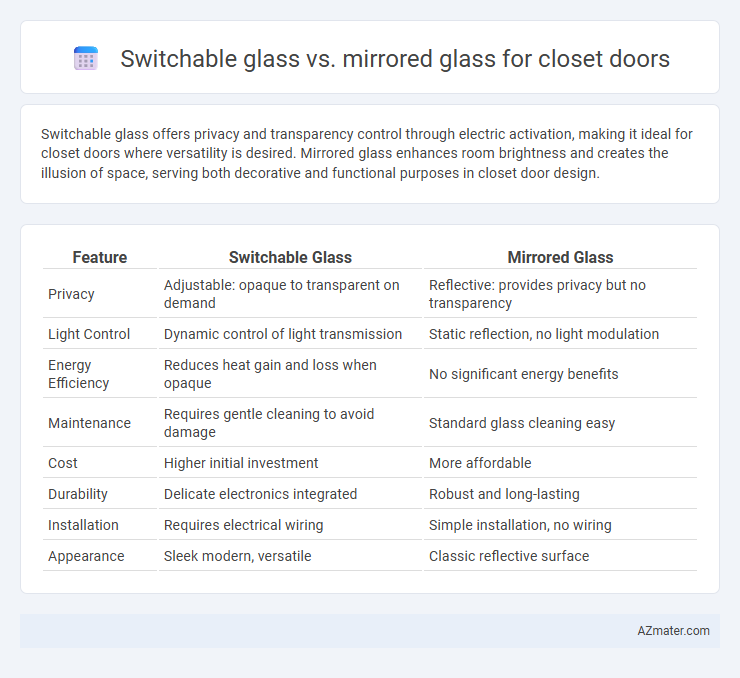Switchable glass offers privacy and transparency control through electric activation, making it ideal for closet doors where versatility is desired. Mirrored glass enhances room brightness and creates the illusion of space, serving both decorative and functional purposes in closet door design.
Table of Comparison
| Feature | Switchable Glass | Mirrored Glass |
|---|---|---|
| Privacy | Adjustable: opaque to transparent on demand | Reflective: provides privacy but no transparency |
| Light Control | Dynamic control of light transmission | Static reflection, no light modulation |
| Energy Efficiency | Reduces heat gain and loss when opaque | No significant energy benefits |
| Maintenance | Requires gentle cleaning to avoid damage | Standard glass cleaning easy |
| Cost | Higher initial investment | More affordable |
| Durability | Delicate electronics integrated | Robust and long-lasting |
| Installation | Requires electrical wiring | Simple installation, no wiring |
| Appearance | Sleek modern, versatile | Classic reflective surface |
Introduction: Closet Door Innovation
Switchable glass and mirrored glass represent innovative options for closet doors, enhancing both functionality and aesthetic appeal. Switchable glass offers privacy on demand by transforming from transparent to opaque with a simple electrical switch, ideal for modern, tech-savvy interiors. Mirrored glass not only maximizes light and space perception but also serves a practical role in daily dressing routines, making it a classic and versatile choice.
What is Switchable Glass?
Switchable glass, also known as smart glass, is an innovative material that can change from transparent to opaque with the application of an electric current, offering privacy and modern aesthetics for closet doors. Unlike mirrored glass, which reflects light and creates a reflective surface, switchable glass provides dynamic control over visibility without altering the design or requiring extra space. This technology improves energy efficiency and allows for customizable light diffusion in residential and commercial closet installations.
What is Mirrored Glass?
Mirrored glass for closet doors is a type of glass coated with a reflective metallic layer, providing a clear and crisp reflection while enhancing the room's brightness and sense of space. Unlike switchable glass, which can change from transparent to opaque with an electrical switch, mirrored glass maintains a constant reflective surface and does not offer privacy control or light modulation. Mirrored glass is ideal for closets when the goal is to combine functionality with a modern aesthetic, allowing users to check their appearance while visually enlarging the room.
Aesthetic Differences
Switchable glass offers a sleek, modern aesthetic by seamlessly transitioning between transparent and opaque states, creating a dynamic and customizable look for closet doors. Mirrored glass provides a classic, reflective surface that enhances room brightness and creates an illusion of greater space but remains visually static. The choice influences the overall ambiance, with switchable glass promoting privacy and versatility, while mirrored glass emphasizes elegance and light amplification.
Privacy and Light Control Comparison
Switchable glass offers dynamic privacy control by transforming from transparent to opaque with the flip of a switch, enabling instant modulation of light and visibility. Mirrored glass provides constant privacy by reflecting external views while allowing interior visibility but can limit natural light penetration. Both options balance privacy and light control differently, with switchable glass delivering adjustable transparency and mirrored glass offering fixed light reflection and privacy.
Durability and Maintenance
Switchable glass offers high durability with its laminated structure, resisting scratches and maintaining clarity over time, while mirrored glass is more prone to cracking and chipping under impact. Maintenance of switchable glass is straightforward, requiring only gentle cleaning to avoid damaging the embedded film; mirrored glass demands careful upkeep to prevent silver backing deterioration and visible stains. Both options provide sleek aesthetics, but switchable glass excels in long-term performance with less intensive maintenance routines.
Installation Requirements
Switchable glass installation for closet doors requires integration of a power source and control system to enable opacity changes, often involving electrical wiring and professional setup. Mirrored glass installation is more straightforward, typically needing secure mounting hardware and proper alignment without electrical components. Both types demand precision fitting within the door frame, but switchable glass necessitates additional considerations for electrical safety and accessibility.
Cost Analysis
Switchable glass for closet doors typically costs between $150 to $300 per square foot, driven by advanced technology that allows transparency control, whereas mirrored glass ranges from $50 to $100 per square foot, making it a more budget-friendly option. Installation expenses for switchable glass are generally higher due to the need for specialized electrical wiring and control systems, while mirrored glass requires standard mounting with minimal additional work. Over time, mirrored glass maintains lower maintenance costs compared to switchable glass, which may incur extra expenses for electrical repairs or replacements.
Energy Efficiency and Insulation
Switchable glass offers superior energy efficiency by controlling light transmission and reducing heat gain or loss through electrochromic technology, which enhances insulation and lowers energy costs in closet spaces. Mirrored glass provides limited insulation benefits but reflects light, potentially increasing heat absorption and reducing overall energy performance. For optimal thermal insulation and energy savings in closet doors, switchable glass outperforms mirrored glass with its dynamic light and heat control capabilities.
Which is Best for Your Closet?
Switchable glass offers privacy on demand by electrically toggling between transparent and opaque states, making it ideal for modern closets where versatility and sleek design are priorities. Mirrored glass enhances the space by reflecting light and creating an illusion of a larger room, perfect for closets needing both functionality and aesthetic appeal. Choosing between switchable and mirrored glass depends on whether you prioritize dynamic privacy or a classic, space-enhancing effect for your closet environment.

Infographic: Switchable glass vs Mirrored glass for Closet door
 azmater.com
azmater.com